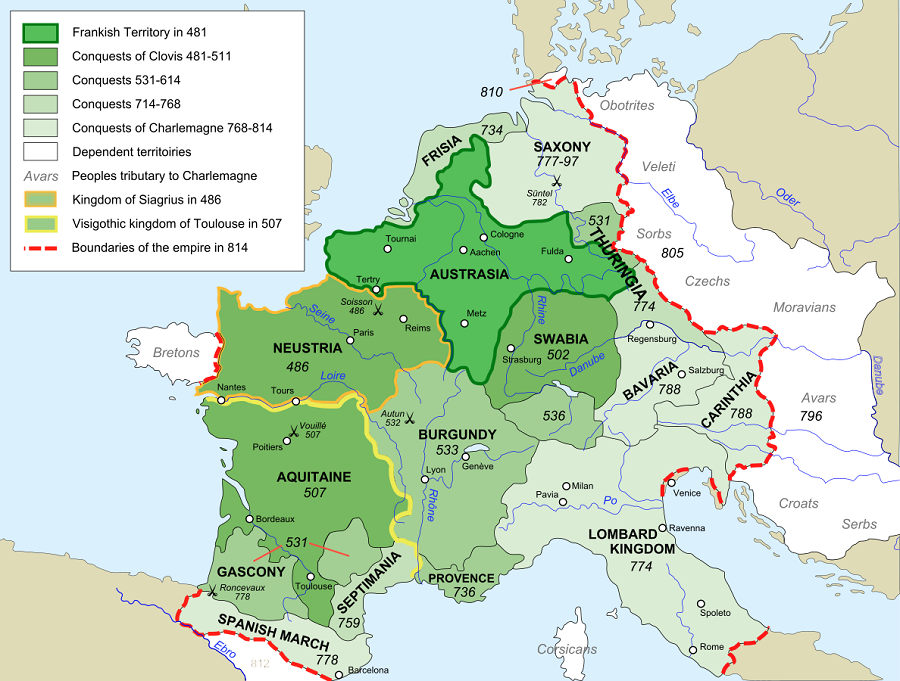“Saxony,” he often repeated, “must be Christianized or wiped out.”
Continuing Charlemagne,
our selection from A Popular History of France from the EarliestTimes, Volume 1 by François P.G. Guizot published in 1869. For works benefiting from the latest research see the “More information” section at the bottom of these pages. The selection is presented in fourteen easy 5 minute installments.
Previously in Charlemagne.
Time: 777-797
Place: Northern Germany

CC BY-SA 3.0 image from Wikipedia
But the vengeance did not put an end to the war. For three years Charlemagne had to redouble his efforts to accomplish in Saxony, at the cost of Frankish as well as Saxon blood, his work of conquest and conversion: “Saxony,” he often repeated, “must be Christianized or wiped out.” At last, in 785, after several victories which seemed decisive, he went and settled down in his strong castle of Ehresburg, “whither he made his wife and children come, being resolved to remain there all the bad season,” says Eginhard, and applying himself without cessation to scouring the country of the Saxons and wearing them out by his strong and indomitable determination. But determination did not blind him to prudence and policy. “Having learned that Wittikind and Abbio, another great Saxon chieftain, were abiding in the part of Saxony situated on the other side of the Elbe, he sent to them Saxon envoys to prevail upon them to renounce their perfidy, and come, without hesitation, and trust themselves to him. They, conscious of what they had attempted, dared not at first trust to the King’s word; but having obtained from him the promise they desired of impunity, and, besides, the hostages they demanded as guarantee of their safety, and who were brought to them, on the King’s behalf, by Amalwin, one of the officers of his court, they came with the said lord and presented themselves before the King in his palace of Attigny [Attigny-sur-Aisne, whither Charlemagne had now returned], and there received baptism.”
Charlemagne did more than amnesty Wittikind; he named him Duke of Saxony, but without attaching to the title any right of sovereignty. Wittikind, on his side, did more than come to Attigny and get baptized there; he gave up the struggle, remained faithful to his new engagements, and led, they say, so Christian a life that some chroniclers have placed him on the list of saints. He was killed in 807, in a battle against Gérold, Duke of Suabia, and his tomb is still to be seen at Ratisbon. Several families of Germany hold him for their ancestor; and some French genealogists have, without solid ground, discovered in him the grandfather of Robert the Strong, great-grandfather of Hugh Capet. However that may be, after making peace with Wittikind, Charlemagne had still, for several years, many insurrections to repress and much rigor to exercise in Saxony, including the removal of certain Saxon peoplets out of their country, and the establishment of foreign colonists in the territories thus become vacant; but the great war was at an end, and Charlemagne might consider Saxony incorporated in his dominions.
He had still, in Germany and all around, many enemies to fight and many campaigns to reopen. Even among the Germanic populations, which were regarded as reduced under the sway of the King of the Franks, some, the Frisians and Saxons, as well as others, were continually agitating for the recovery of their independence. Farther off, toward the north, east, and south, people differing in origin and language — Avars, Huns, Slavons, Bulgarians, Danes, and Northmen — were still pressing or beginning to press upon the frontiers of the Frankish dominion, for the purpose of either penetrating within or settling at the threshold as powerful and formidable neighbors. Charlemagne had plenty to do, with the view at one time of checking their incursions, and at another of destroying or hurling back to a distance their settlements; and he brought his usual vigor and perseverance to bear on this second struggle. But by the conquest of Saxony he had attained his direct national object: the great flood of population from east to west came, and broke against the Gallo-Franco-Germanic dominion as against an insurmountable rampart.
This was not, however, Charlemagne’s only great enterprise at this epoch, nor the only great struggle he had to maintain. While he was incessantly fighting in Germany, the work of policy commenced by his father Pepin in Italy called for his care and his exertions. The new King of the Lombards, Didier, and the new Pope, Adrian I, had entered upon a new war; and Didier was besieging Rome, which was energetically defended by the Pope and its inhabitants. In 773, Adrian invoked the aid of the King of the Franks, whom his envoys succeeded, not without difficulty, in finding at Thionville. Charlemagne could not abandon the grand position left him by his father as protector of the papacy and as patrician of Rome. The possessions, moreover, wrested by Didier from the Pope were exactly those which Pepin had won by conquest from King Astolphus, and had presented to the Papacy. Charlemagne was besides, on his own account, on bad terms with the King of the Lombards, whose daughter, Désirée, he had married, and afterward repudiated and sent home to her father, in order to marry Hildegarde, a Suabian by nation. Didier, in dudgeon, had given an asylum to Carloman’s widow and sons, on whose intrigues Charlemagne kept a watchful eye.
| <—Previous | Master List | Next—> |
More information here and here, and below.
 |
We want to take this site to the next level but we need money to do that. Please contribute directly by signing up at https://www.patreon.com/history
Leave a Reply
You must be logged in to post a comment.